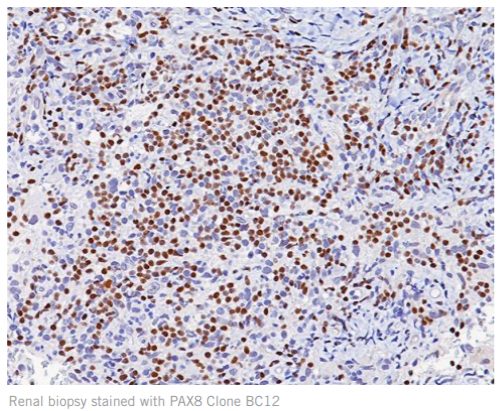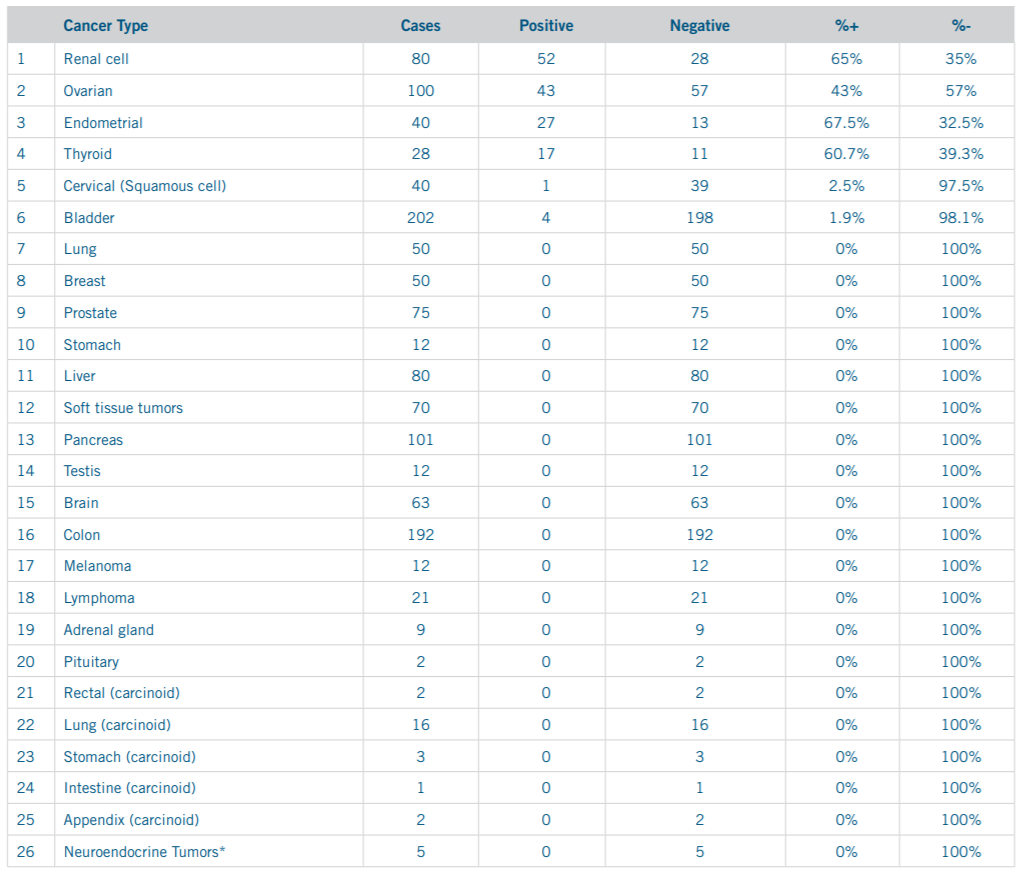Monoclonal PAX8 Packs a Punch – Enhanced Specificity with No Cross Reactivity
For kidney, ovarian and thyroid cancers, PAX8 has been shown to be a useful marker which can identify both primary and metastatic tumors of these types. PAX8 nuclear expression is easily interpreted and diagnosed in the presence of non-specific background staining. Unfortunately, the currently available commercial anti-PAX8 (P) polyclonal antibodies have the disadvantage of cross-reactivity with lymphocytes, particularly B-cells, which may frequently infiltrate into the site of a tumor. Since lymph nodes can naturally contain a lot of B-cells, a lymph node sample stained with PAX8 (P) may result in extensive staining of B-cells, making the identification of infiltrating metastatic tumor cells difficult.¹
To enhance PAX8 specificity and enable a more confident and accurate diagnosis, Biocare Medical created a new PAX8 mouse monoclonal antibody (clone BC12). To test this monoclonal antibody’s sensitivity and specificity, over 1260 cases of various cancers were stained and evaluated. In a direct comparison, PAX8 (M) was more sensitive than PAX8 (P) in clear cell and papillary renal cell carcinoma, providing equal sensitivity in ovarian serous cystadenocarcinomas (91.4%) and a slight increased sensitivity in endometrioid adenocarcinomas (72.9% vs. 67.6%), respectively. In tumors where positive PAX8 (M) was observed, staining was nuclear and background staining was minimal. All carcinoid tumors, including rectal, lung, colon, and appendix were negative; and neuroendocrine tumors, including stomach, adrenal, colon, esophageal, cardial, and small lung cell carcinomas were negative for PAX8 (M). This clone proved to not cross-react with B-cells, cells of pancreatic origin, or neuroendocrine cells of the stomach and colon.¹
PAX8 mouse monoclonal [BC12] is highly sensitive in renal cell carcinomas (especially for clear cell and papillary renal cell carcinomas), ovarian cancers (including serous and endometrioid phenotypes), and stains the majority of endometrial and thyroid cancers; however, it does not cross-react with B-cells and pancreatic or carcinoid tumors. The elimination of B-cell staining is advantageous when assessing metastasis in lymph nodes, thus the ease of interpretation is improved. As a monoclonal antibody, clone BC12 offers the advantage of a specific and unique epitope and is available as a constantly renewable source, eliminating the potential batch-to-batch variability found in polyclonal antibodies.¹
PAX8 Monoclonal Vs. Polyclonal – Renal Cell Carcinoma

PAX8 Sensitivity in Neoplastic Tissues

Interested in testing PAX8 clone BC12 in your lab? Whether you are switching from a different vendor or interested in bringing in PAX8 as a new marker to your lab, our friendly staff is here to assist. Please contact Biocare anytime at 800-799-9499 or click the link here: https://biocare.net/product/pax8-antibody/ .
1. Tacha, D. et al., “PAX8 Mouse Monoclonal Antibody [BC12] Recognizes a Restricted Epitope and is Highly Sensitive in Renal Cell and Ovarian Cancers, but does not Cross-React with B-cells and Tumors of Pancreatic Origin”. United States & Canadian Academy of Pathology. Vancouver Convention Centre. 17 March 2012. Poster Presentation.

